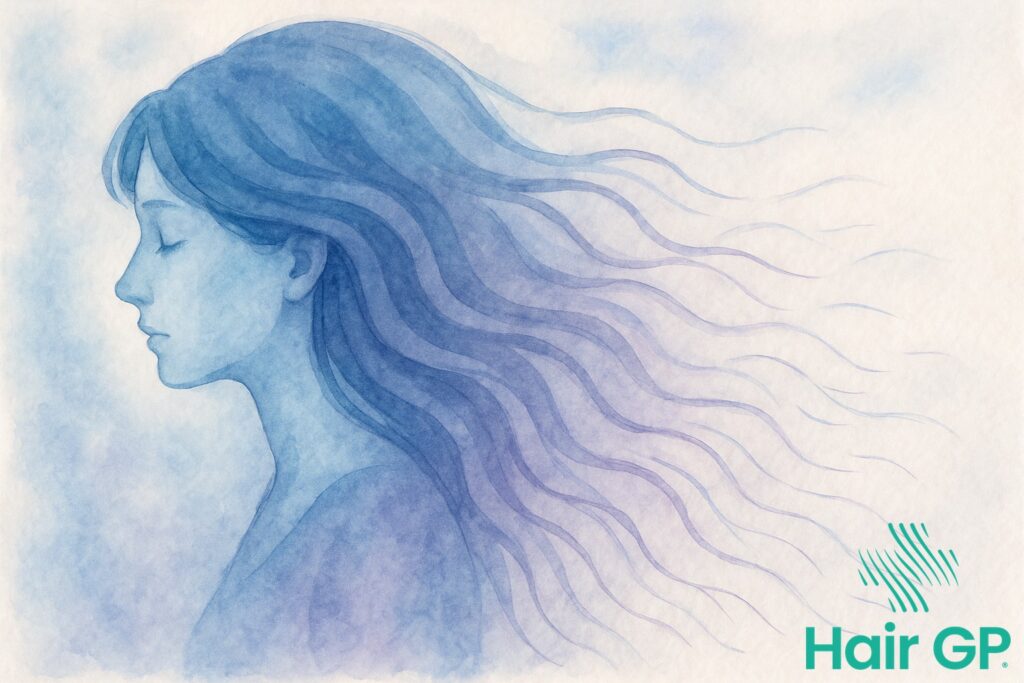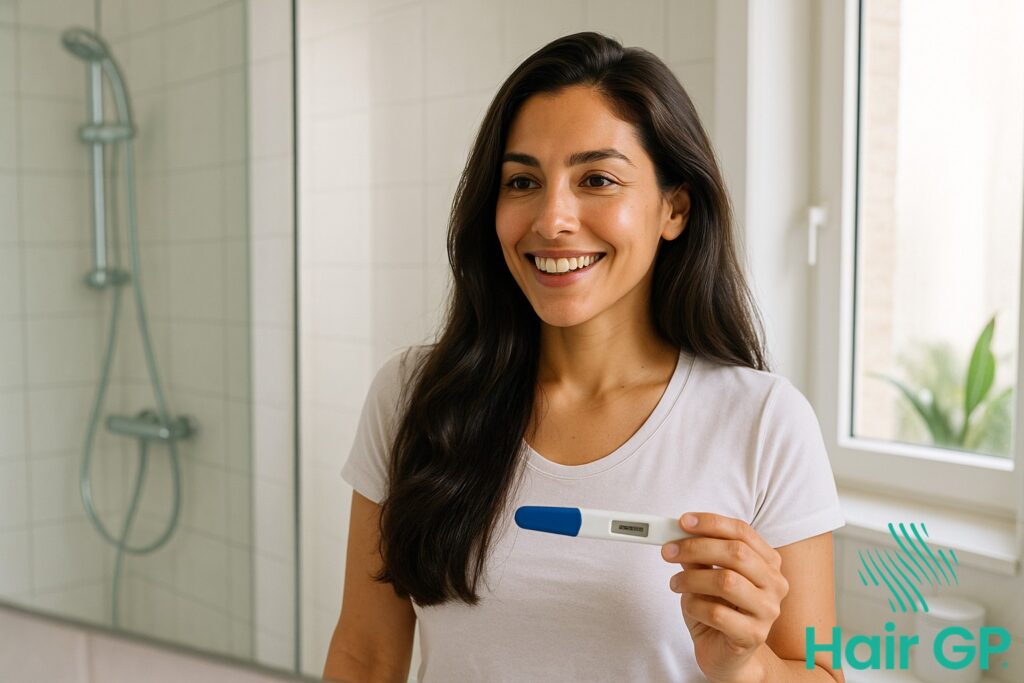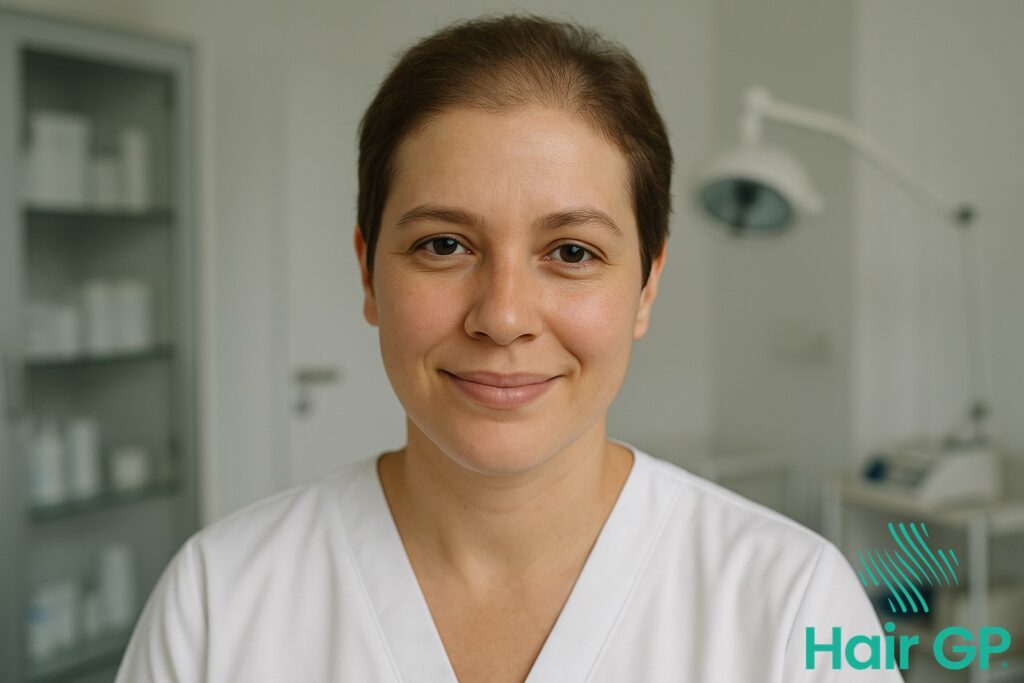Introduction
Experiencing hair loss after a miscarriage can feel like an additional burden during an already challenging time. If you’re noticing increased hair shedding following pregnancy loss, you’re not alone – this is a common yet often unexpected consequence that many women face. Understanding why this happens and knowing what to expect can provide comfort and reassurance during your recovery journey.
The connection between miscarriage hair loss and hormonal changes is significant. During early pregnancy, your body produces elevated levels of hormones that support both your pregnancy and promote healthy hair growth. When pregnancy loss occurs, these hormone levels drop suddenly, triggering a response in your hair follicles that can lead to noticeable shedding weeks or months later. Combined with the emotional stress of losing a pregnancy, your body undergoes multiple changes that can affect your hair’s growth cycle.
This comprehensive guide will walk you through everything you need to know about hair regrowth after miscarriage. We’ll explore the science behind why hair loss occurs, provide realistic timelines for when you can expect improvement, and identify different types of hair shedding you might experience. You’ll learn about nutritional strategies to support healthy regrowth, discover gentle hair care techniques for this sensitive time, and understand how managing stress can positively impact your recovery. We’ll also help you recognise when it’s important to consult with a healthcare provider about your symptoms. Remember, whilst hair loss following miscarriage can be distressing, it’s typically temporary, and your hair will grow back.
Key Takeaways – TL/DR
- Hair typically begins regrowing within 3-6 months after miscarriage, with full recovery taking up to a year
- Post-miscarriage hair loss is usually caused by telogen effluvium triggered by hormonal shifts and stress
- Proper nutrition, stress management, and gentle hair care can support healthy hair regrowth
- Seek medical advice if hair loss persists beyond 6 months or is accompanied by other symptoms
- Emotional support and self-care are crucial during the recovery process
Understanding Hair Loss After Miscarriage
Understanding the biological mechanisms behind hair loss after miscarriage can help explain this distressing symptom. During pregnancy, elevated pregnancy hormones like oestrogen and progesterone keep hair follicles in the anagen phase (active growth stage) for extended periods, resulting in thicker, fuller hair [1]. When miscarriage occurs, these hormone levels plummet abruptly, triggering a physiological response that affects the normal hair growth cycle.
This sudden hormonal shift causes numerous follicles to simultaneously enter the telogen phase (resting stage), a condition known as telogen effluvium. Typically, only 10-15% of scalp hairs are in the telogen phase at any given time, but after miscarriage, this percentage can increase to 30% or more [2]. The emotional stress of pregnancy loss further compounds this effect, as psychological trauma can independently trigger telogen effluvium.
The result is noticeable hair shedding that typically begins 2-4 months after the miscarriage, when telogen hairs naturally fall out. While alarming, this process is temporary – follicles remain healthy and will eventually return to their normal growth cycle.
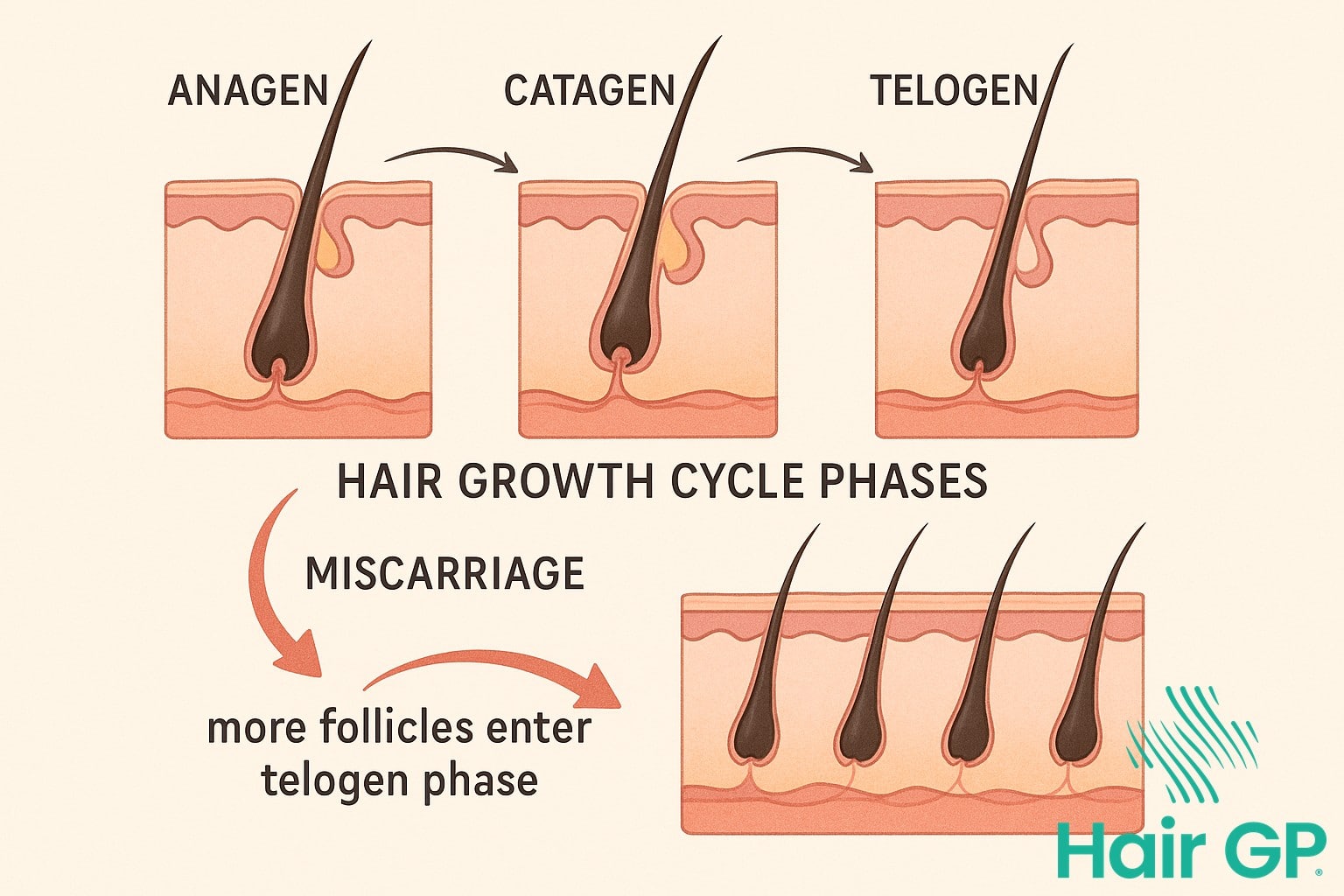
Timeline: When to Expect Hair Regrowth
Understanding the timeline for hair regrowth after miscarriage can help you track your recovery progress and set realistic expectations. Whilst the shedding phase can be distressing, knowing when to expect improvements provides reassurance that this temporary condition will resolve.
Initial Hair Loss Phase (1-3 Months)
Hair loss typically begins about three months following miscarriage, though some women notice shedding earlier. This delay occurs because follicles enter the telogen (resting) phase immediately after hormonal disruption, but actual shedding doesn’t happen until weeks later. During peak shedding, you may lose 100-300 hairs daily[1], significantly more than the normal 50-100 hairs.
Recovery and Regrowth Phase (3-12 Months)
New hair growth usually becomes visible 3-6 months after shedding begins. These baby hairs may initially appear finer or have different texture. Most women see their hair grow back to full density within 6-12 months. The complete hair growth cycle ensures gradual but steady improvement as follicles return to their normal phases.
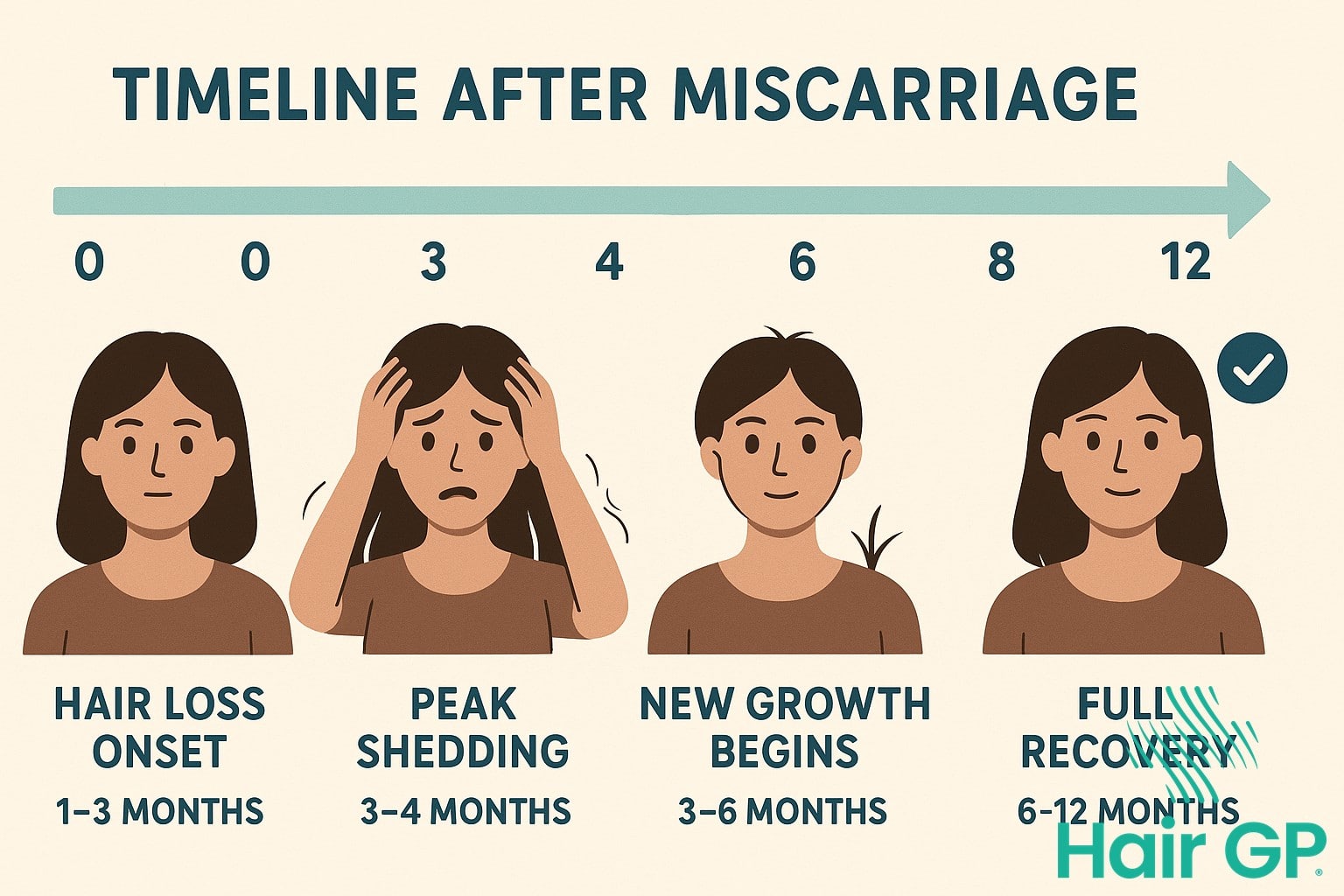
Types of Hair Loss Following Pregnancy Loss
Following pregnancy loss, women may experience various types of hair loss, each with distinct characteristics that influence treatment approaches. Understanding your specific hair loss pattern helps determine the most appropriate management strategy.
Telogen Effluvium: The Most Common Type
The condition called telogen effluvium accounts for approximately 90% of postpartum hair loss cases following miscarriage [3]. This type presents as diffuse hair loss across the entire scalp, rather than concentrated patches. The physical and emotional stress of pregnancy loss triggers hair follicles to enter the resting phase prematurely, resulting in increased shedding 2-3 months later.
Other Hair Loss Conditions
Less common patterns include alopecia areata, characterised by circular patches of complete hair loss, and trichotillomania, a stress-induced compulsion to pull hair. Whilst telogen effluvium typically resolves within 3-6 months, these conditions may require specific psychological or medical interventions [4].
Hormonal Changes and Their Impact on Hair
During pregnancy, elevated levels of pregnancy hormones, particularly oestrogen and progesterone, extend the hair’s growth phase, resulting in thicker, fuller hair. Following early pregnancy loss, stillbirth, or abortion, these hormone levels plummet rapidly[5]. This sudden hormonal change disrupts the normal hair growth cycle, pushing many follicles simultaneously into the resting phase.
The abrupt withdrawal of progesterone and oestrogen triggers a condition called telogen effluvium, where hair follicles prematurely enter the shedding phase[3]. These hormonal changes typically occur within days of pregnancy loss, though hair shedding may not become noticeable until two to three months later. Understanding this delay helps explain why hair loss often appears when emotional healing has begun, adding unexpected distress to an already challenging recovery period.
Nutritional Support for Hair Regrowth
Proper nutrition plays a vital role in supporting hair regrowth after miscarriage. A balanced diet rich in essential nutrients can help restore hair health and promote healthy hair growth, whilst addressing common post-pregnancy deficiencies.
Essential Nutrients for Hair Growth
Iron and ferritin are crucial for maintaining healthy hair follicles and preventing excessive hair loss. B-complex vitamins, support keratin production and overall hair strength. Adequate protein intake from lean meats, eggs, and legumes provides the structural building blocks necessary for hair growth.
Addressing Common Deficiencies
Iron deficiency affects up to 30% of women after miscarriage due to blood loss[1]. Blood tests can identify specific nutritional gaps that may impair hair health. The Cleveland Clinic recommends addressing deficiencies through a balanced diet first, then considering supplements under medical guidance to support healthy hair growth.

Gentle Hair Care Practices During Recovery
During recovery, protecting your hair from further damage is essential. Avoid harsh treatments like chemical straightening, perming, or aggressive bleaching, which can weaken already fragile strands. To prevent hair loss from worsening, switch to sulphate-free shampoos and limit washing to twice weekly. Gently massage your scalp whilst shampooing to stimulate circulation as hair follicles enter their recovery phase. Skip tight hairstyles that pull on roots, and replace metal hair ties with soft fabric alternatives. Heat styling should be minimised – allow hair to air-dry when possible. These simple adjustments help stop hair loss from progressing whilst supporting natural regrowth.
Managing Stress and Emotional Well-being
Women who have miscarried often experience hair loss alongside profound grief, creating additional emotional stress during an already difficult time. Acknowledging these feelings is crucial for healing, as the mind-body connection significantly influences hair health. Managing stress through gentle practices like meditation, journaling, or speaking with a bereavement counsellor can help regulate cortisol levels that affect hair growth cycles.
Prioritising self-care, including getting enough sleep and maintaining regular meal times, supports both emotional recovery and physical healing. Many women find comfort in support groups where others understand the dual challenge of processing grief whilst managing physical pregnancy symptoms that linger, including hair changes. Remember that experiencing this hair loss is a normal physiological response, not a reflection of personal failure or weakness.

When to Seek Medical Help
Whilst postpartum hair loss typically resolves naturally, certain symptoms warrant immediate consultation with your healthcare provider. If you experience heavy bleeding, sudden bald patches, or lose hair in clumps rather than gradual shedding of more hairs daily, professional evaluation becomes essential. Additional red flags include persistent hair loss beyond six months, accompanying scalp pain, or systemic symptoms like unexplained weight changes. Diagnostic tests may include blood work to assess thyroid function, iron levels, and hormonal balance. During consultation, expect detailed medical history review and physical examination to rule out underlying conditions requiring treatment.
Conclusion
While experiencing hair loss after pregnancy loss can feel overwhelming, it’s crucial to remember that hair regrowth is the expected outcome for most women. Your follicles remain healthy and capable of producing new hair, regardless of which trimester the loss occurred in. The timeline for recovery varies individually, with some women noticing their hair grow back within three to six months, whilst others may require up to a year for complete restoration.
During this recovery period, practicing self-care becomes paramount. Nourishing your body with balanced nutrition, managing stress levels, and being patient with the natural healing process all contribute to optimal hair regrowth. Remember that your body has experienced significant hormonal changes, similar to those after giving birth, and requires time to recalibrate.
Most importantly, don’t hesitate to seek support when needed. Whether from healthcare providers, counsellors, or support groups, reaching out can help you navigate both the emotional aspects of pregnancy loss and the physical changes you’re experiencing. Your journey is unique, and with proper care and patience, your hair will return to its former vitality as your body heals.
Frequently Asked Questions
Yes, hair loss after miscarriage is very common and affects many women. The sudden drop in pregnancy hormones combined with physical and emotional stress can trigger telogen effluvium, causing temporary hair shedding that typically begins 1-3 months after the loss.
While losing 50-100 hairs daily is normal, losing 200-300 hairs per day during the acute phase of telogen effluvium is common. However, if you notice bald patches, lose hair in clumps, or experience hair loss lasting longer than 6 months, consult your healthcare provider.
While you may not be able to completely prevent hair loss due to hormonal changes, you can minimize it by maintaining good nutrition, managing stress, getting enough sleep, avoiding harsh treatments, and taking prenatal vitamins to support overall health during recovery.
Some women notice temporary changes in hair texture during regrowth, such as increased curliness or different thickness. These changes are usually temporary, and hair typically returns to its pre-pregnancy texture within a year.
Yes, continuing prenatal vitamins for several months after miscarriage can support hair regrowth by providing essential nutrients like iron, biotin, and folic acid. Consult your healthcare provider about the appropriate duration for your situation.
References
- LYNFIELD YL. Effect of pregnancy on the human hair cycle. J Invest Dermatol. 1960. PMID: 13764567
- Asghar F, Shamim N, Farooque U, Sheikh H, Aqeel R. Telogen Effluvium: A Review of the Literature. Cureus. 2020. PMID: 32607303
- Grover C, Khurana A. Telogen effluvium. Indian J Dermatol Venereol Leprol. 2013. PMID: 23974577
- Malkud S. Telogen Effluvium: A Review. J Clin Diagn Res. 2015. PMID: 26500992
- Toffol E, Koponen P, Partonen T. Miscarriage and mental health: results of two population-based studies. Psychiatry Res. 2013. PMID: 22985545

